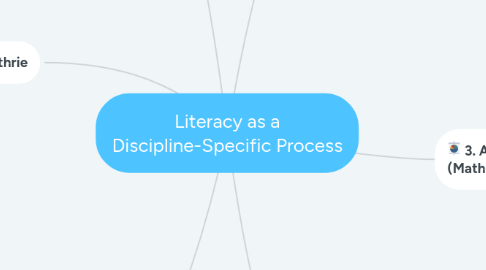
1. 1. Content Area Literacy
1.1. What is it? "The ability to use reading and writing for the acquisition of new content in a given discipline."
1.2. Content area literacy focuses on general reading and writing strategies to improve knowledge, skills. and performance.
1.3. Common Misconceptions: 1. "Assumptive Teaching", Students know how to read and comprehend texts they read. 2. Students have adequate prior content area literacy. 3. Students are equally comfortable with literary and informational texts
2. 5. Disciplinary Literacy Learning Principles
2.1. 1. Learning is a Socially Constructed Process
2.1.1. The classroom should promote student to student discussion, and learning takes place from collaboration.
2.2. 2. Teacher as Mentor, Student as Apprentice
2.2.1. An approach to create a community of practice, with students engaging in real-world practices
2.3. 3. Content and Literacy Knowledge Develop in Tandem
2.3.1. The skills of content and literacy knowledge are integrated instead of isolated, problems are solved with disciplinary literacy at the center
2.4. 4. Students Engage in Discipline- Specific Inquiry Learning
2.4.1. Students use previous discipline knowledge with new information to problem solve
2.5. 5. Assessment to Drive Instruction, Instruction to Drive Assessment
2.5.1. Teachers utilize various types of formal and informal assessments of student progress and performance to plan future instruction.
2.5.2. Furthermore, assess students' content and disciplinary literacy to manage their teaching strategies
3. 6. How it Relates to Guthrie
3.1. Students are often uninterested and unmotivated to read, which in turn create literacy challenges, both in content area and disciplines.
3.2. Motivation is key for effectiveness, which Zurgouris-Coe alludes to in various principles (Most specifically in principles 1 and 2)
3.3. Both aim to transform curriculum and schools
3.3.1. Content knowledge is crucial, so figuring out ways to maximize student intake to keep up is a central focus
3.3.2. Struggling or disengaged readers will fall further behind when coming into classes with "assumptive teaching"
3.4. Teacher take on many of the responsibilities as described in Zygouris-Coe Figure 2.5 to create engagement and interest for students to read and succeed
4. 2. Disciplinary Literacy
4.1. Learning how to communicate and use information within a discipline in an expert like manner
4.2. Characterized by deep reading and comprehension of texts and making connections between information and concepts
4.3. General literacy skills are necessary, but not sufficient to master disciplinary content
4.3.1. College, career, and workforce readiness is contingent upon the development of disciplinary literacy skills
4.4. Disciplinary literacy should be an integral part of disciplinary practice as opposed to a set of strategies or tools
5. 3. Academic Disciplines (Mathematics)
5.1. A foundational area of human knowledge, supports technology, economic life and overall societal development
5.2. Includes but is not limited to: 1. Algebra 2. Geometry 3. Topology 4. Applied Mathematics
5.2.1. Probability and Statistics Computer Science Physical Sciences
5.3. Some students think of mathematics as: 1. Pointless definitions, formulas, theorems 2. Irrelevant to everyday life
5.4. Mathematics is not about procedure memorization, but solution seeking.
5.4.1. Patterns
5.4.2. Reasoning
5.4.3. Directly related to real world problems and questions
6. 4. Why Position Literacy in the Disciplines?
6.1. Each discipline is unique and each require different approaches, strategies, and practices
6.1.1. Oftentimes, discipline specific topics or procedures are associated with problem solving
6.1.2. Knowing arbitrary facts and concepts is not sufficient to use disciplinary knowledge effectively
6.2. Content is important, but practices and processes are crucial for development of content knowledge
6.3. As a teacher, instruction should be designed around:
6.3.1. 1. Content Knowledge
6.3.1.1. Core concepts, ideas, and problems of the discipline
6.3.2. 2. Habits of Mind
6.3.2.1. Ways of thinking, knowing, learning about, and problem solving strategies of the discipline
